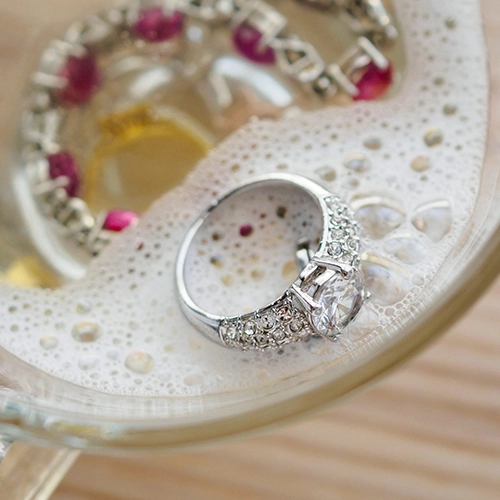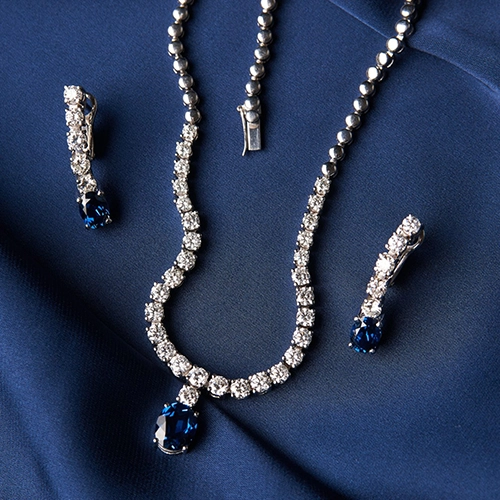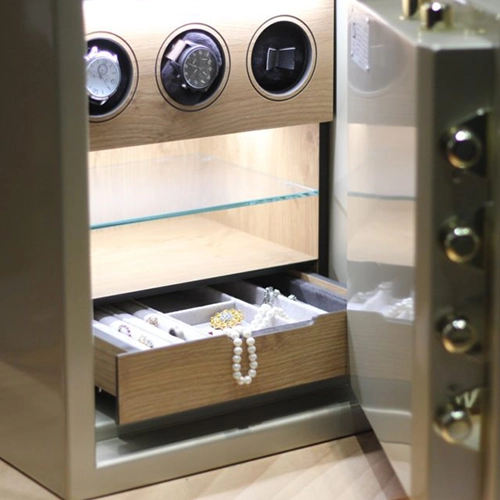01 June 2023
Looking after your jewellery: cleaning tricks to storage tips
7 minutes
A jewellery collection is precious both financially and sentimentally – so it’s important to take good care of it. Keeping your jewellery safely stored and insured is the first step, while regular cleaning will make sure your jewellery remains in the best condition, helping your collection retain its value. Take your pieces to be professionally cleaned by a jeweller every year and, in between, you can use the following tips to take the best care of your jewels at home.
1. Regularly clean jewelleryIt’s easy to forget that jewellery can be tarnished or damaged from everyday tasks like showering, exercising, cooking, household cleaning, or even simply using lotions or perfumes. To avoid this type of wear and tear, remove your jewellery if you’re using any household chemicals or heading to the gym or for a swim. This will help your jewellery keep its lustre, whether gold, silver, platinum, or gemstone. When it comes to cleaning, try to do this yourself every few months to prevent the risk of discolouration and the build-up of dirt which could irritate your skin. To clean jewellery, you can buy purpose-made equipment but, for most precious metals and stones, warm soapy water,alongside a soft-bristled brush (like a toothbrush), and a clean, soft cloth are all you need. If you want something a little more specialised, many jewellers recommend or sell cleaning solution so you can keep your jewellery shining brightly. Often these are simple to use – all you need to do is drop the jewellery into the solution, leave for a few moments, then remove with tweezers and use your soft-bristled brush to gently clean it before drying with the cloth. If looking for products online, it’s a good idea to read the reviews before ordering to make sure the cleaner is made by a trusted brand. |
|
Ultrasonic jewellery cleaning
Another option is ultrasonic jewellery cleaning. This process uses a purpose-built device to pass high frequency pressure waves through a solution to clean jewels, with the ability to reach the tiniest gaps and recesses. Ultrasonic cleaners are best when used on robust jewellery, as they can be too powerful for delicate pieces. Some gems, like emeralds, are too fragile for ultrasonic jewellery cleaning and even some diamonds can be compromised if they have any small cracks or imperfections, so it’s important to use only a high-quality ultrasonic cleaner on items of jewellery you know to be strong enough. For these pieces, they are highly effective.
At the end of the day, the best way to clean jewellery at home will depend on what it’s made from, so we’ve outlined the best methods below.
How to clean gold or platinum jewellery
Gold and platinum jewellery is pretty straightforward to look after. A gentle solution of washing up liquid and warm (not too hot) water is an effective cleaner – simply soak your pieces for between 15 and 30 minutes to let the soapy water get to work on the grease and dirt. If it’s a piece you wear a lot, for example a wedding ring or favourite necklace or earrings, you can always add a dash of soda water – the fizz will help loosen any dirt and debris that’s built up over time.
Once soaked, use a clean and soft-bristled toothbrush to gently clean your gold and platinum jewellery, taking care to get inside any crevices or nooks. Keep the pressure soft, as you don’t want to risk scratching the surface. Then, once you’ve removed all the dirt, rinse thoroughly under warm water – with the plug in, to prevent any delicate jewels slipping down the plughole! Lastly, dry it with your soft cloth.
The best way to clean silver jewellery
Unlike gold and platinum, silver reacts to oxygen and sulphur particles in the air, causing it to tarnish over time. This means silver jewellery needs more regular and specialist cleaning to keep it as bright as possible. If a mixture of warm water and washing up liquid isn’t enough, try one of the following methods:
- Silver chemical dip – among the best ways to clean silver, this type of solution is made specially for tackling tarnish and uses a reactive chemical that’s highly effective at returning your silver jewellery to its former glory. However, the chemicals can be acidic so don’t let it touch any gemstones, and the solution itself can be messy, smelly, and toxic so must be handled carefully.
- Baking soda paste – easily made at home, this thick paste is made from three parts baking soda to one part water. Simply spread it over your silver jewellery into all the nooks and crannies, then rinse the paste away and buff your jewellery dry with your cloth.
- Hot aluminium foil dip – a handy tip if you need a powerful cleaner but you don’t have any chemical dip is to make your own solution by boiling a litre of water and adding a tablespoon of baking soda and a piece of aluminium foil. Believe it or not, this mixture is great at removing tarnish from silver jewellery – just wait until the water is fizzing and place your jewellery into the solution for 30 seconds (or longer for tougher dirt). Then simply remove with a pair of tongs and buff your jewellery dry.
 |
Cleaning gemstonesThere are so many beautiful gemstones used in jewellery these days. For the most part – including diamonds, emeralds, rubies and sapphires –they can be washed gently using warm water with a dash of washing up liquid.. As you would with precious metals, soak your gems for a up to half an hour, gently brush away the loosened grime with a brush, and polish them dry with a soft cloth. That said, it’s worth bearing in mind that some gems require different treatment. Pearls, for example, aren’t technically gemstones as they’re formed underwater as a by-product of oysters, mussels, and clams. As such, they need a little extra care. You should wipe them clean with a damp, soft cloth and use a mild soapy solution on a cloth to gently rub away any stains. After washing, make sure you dry your pearls thoroughly as trapped moisture can cause discolouration.
|
2. Inspect clasps and settingsLots of jewellery is delicate, with different types of tiny clasps keeping necklaces and bracelets fastened, and settings to secure jewels in place. Whether you wear a piece of jewellery on a daily basis or you only bring it out for special occasions, make a habit of inspecting the condition of its clasps and settings to avoid losing a precious piece or stone while you’re out and about. Always treat delicate jewellery with care too. Try to avoid tugging on stiff clasps to open them – if they’re proving problematic, take them to a jeweller who will be able to refashion the clasp to be easier to use. Take care where you leave your jewels too – for example, don’t leave anything heavy on top of a piece of jewellery, which could crush and break a fragile clasp, and be careful not to leave your jewels in high humidity, or wet and soapy after a clean. This could lead to residue building up and compromising the clasp action. The same goes for settings – make sure they aren’t bent from getting caught or crushed and keep them clean and dry. And, when you’re not wearing your jewellery, make sure it’s stored properly. |
 |
 |
3. Store your jewels carefullyAs a rule, jewellery should be stored in a dry environment, preferably in a purpose-made jewellery box with soft fittings that keep the jewels separate from each other to avoid scratches. This is especially true if your pieces are set with gemstones such as diamonds, rubies, sapphires, or emeralds. You can store jewellery in cotton bags to help protect them from moisture, for example gold and platinum jewellery. While you’ll never be able to stop your silver jewellery tarnishing, you can store silver in such a way as to slow down the process – for example, wrapping it in a cloth or popping it in a pouch or a sealable bag. You could also try adding silica pouches to your jewellery box to help keep moisture to a minimum. That said, you should never keep pearls in dry airtight containers as they may crack without exposure to moisture. It’s best to wrap pearls in cotton or linen where they can breathe, while remaining protected from the risk of scratches from harder stones and metals. |
4. Consider extra securityJewels are always going to be a target for thieves. Whether of financial or sentimental value, the loss of a treasured piece of jewellery can be devastating. It’s therefore important to consider how safely you store your jewels. Is your jewellery box hidden from sight? Does it have a lock? For high-value collections, you may need to invest in a safe. There are a range of grades to choose from on the market, and we’ve explained your options in our article: Safety First – top tips for your home safe. You may even find your home insurance specifies the need to keep certain jewels in a specific grade of safe in order to validate your policy – just ask your insurer or broker if you’re unsure. Lastly, when you keep valuable jewels at home, it’s always beneficial to regularly review your home security in general. We’ve pulled together a list of top home security tips that can help you protect your home from break-ins and thefts. |
 |
5. Have your collection valued and insured
With the best will in the world, accidents happen and thefts occur and when it comes to jewellery, you can’t be too careful. Getting the right insurance is crucial. It will give you the peace of mind that if the worst were to happen, you have the right cover in place to replace at least the value of the jewellery, if not the piece itself. That’s why regular professional jewellery valuations are vital, especially as market rates for precious metals and stones fluctuate quickly.
Insurers will require any valuation to be for “insurance purposes” and for retail value. You should also consider how you would replace your jewellery in the event of a loss. Would you want a brand-new replacement with a modern equivalent (New Replacement Value) or would you prefer an antique replacement (Antique Replacement Value)?
Ensure your jewellery is photographed, kept in good condition, and your documentation is in a safe place to help in the event of a claim. Remember to send a copy of your valuations to your broker, whether or not your insurer requires it.
Howden are specialists in finding the right jewellery insurance solution, something you should never have to do on your own. We can point you in the direction of trusted valuation experts and then arrange a policy which will protect your passion and investment.
To speak to Howden about insuring your jewellery call 020 8256 4901 or email privateclients@howdeninsurance.co.uk.

